Germany Gone Amok
  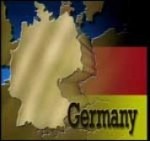 Training People To be Scholars & Scientists & Paying People Not To Work  Germans Are Spoiled Brats Living Too Well and Not Willing To Bite the Bullet & Change Amidst all the hand-wringing in Germany about the highest unemployment levels since the thirties, the fact is that Germany’s economy is in much better shape than many critics, in and outside of Germany, think. The fundamentals of Europe’s largest economy – a large supply of capital, a skilled labor force, a modern infrastructure and a stable political and legal system – are all in place. Germany needs to clear some obstacles to their full use. But it is not the economy which is failing. It is political will.  The recent meeting of government and opposition in Berlin, designed to respond to public panic about the spike in unemployment, was more about political posturing than changing policy. 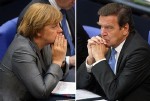 Chancellor Schröder and his opponent, Angela Merkel, are positioning themselves for the battle over the next federal election scheduled in the fall of 2006. Germany is and has been one of the world’s leading exporters with a healthy balance of payments surplus of 3 percent of GDP and a strong demand for its products world wide. Germany attracts high levels of foreign direct investment. 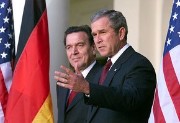 The United States has investments totaling over 110 billion euros, not counting the wave of private equity investments to the tune of thirty billion euros in the last few years. 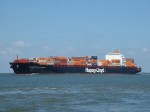 Leading German firms such as Siemens and BMW maintain top level research and development operations not only in Germany but around the world. General Electric has built an enormous research center in Munich.  Measured against the rest of Europe, and even the United States, Germany’s labor productivity is competitive. The problems burdening Germany’s domestic economy are essentially the result of a cumulative building up of public expenditures and regulatory policies, which have caused the individual and the corporate citizen to become discouraged from taking initiatives and risks. 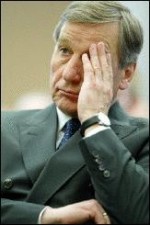 High taxes and expensive added costs to salaries have decreased incentives for companies to add jobs. High unemployment benefits have undercut the urgency among the unemployed to seek new jobs. During the past few years, Germany has been reducing tax levels and toughening its unemployment benefits.  Wage negotiations have seen a leveling off of salaries as well as an increasing degree of flexibility in reaching agreement between labor and employers throughout the country. Despite these steps, Germany remains confronted with low growth rates, and high unemployment figures, even while it is the world’s leader in exports. The problems have more to do with sluggish political institutions and the interests behind them, which are unwilling to forgo their advantages. There is also the continuing dilemma of an uncertain eastern German environment, into which has been poured a huge amount of money with very uneven results during the past fifteen years.  The main challenge facing Germany is not that it is economically weak but that it is politically stuck. Efforts to make changes have been going on for many years but most of those efforts stall in the face of political gridlock.  But for most Germans, the need to make significant changes if Germany is to get itself running on all cylinders was not fully grasped in a country that looked and felt so wealthy. reference .... *German Unions & Social Democrats The battles between the political parties over revenue sharing among the states, over rights and responsibilities of the states and the federal government, seem to lock the country into a permanent logjam in a culture that values consensus over conflict.  Today, the need for unleashing Germany’s full economic potential is not only essential for Germany but it is vital for Europe and indeed the transatlantic community. Germany is too important not to be exercising its full influence and using its full weight to help itself at home and contribute to a growing global economy, on which it is particularly dependent. The obstacles are more political than they are economic. They are more attitudinal than institutional. Despite its problems, Germany is a country wealthy in many dimensions, in terms of capital, human resources and productivity. Unlocking that full potential is what the political leadership knows it needs to do. 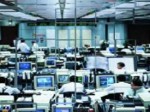 Most Germans are now well aware of what needs to be done after years of debating the issues. The facts speak for themselves, be it the looming crisis in social security, rising health care costs, low birth rates, long-term unemployment, all threatening to undermine the capacity of the country to grow into the future. In the end, the political leadership of Germany needs to make clear that the need for reforms is long-term, not a quick fix that will deal only with the immediate challenges ahead. Chancellor Schröder tried to communicate that with his emphasis on looking at Germany in 2010 and taking the steps now to get there successfully.  Whether it is he or opposition leader Angela Merkel who will be the leader who gets Germany there, the fact is that the prescription for recovery is not going to be radically different. The country knows what has to be done. But it will require politicians and their voters to understand that it is not the economy stupid; it’s politics. reference ... *The Perils of Polarizing: Germany's Capitalism Debate In his new book “The World is Flat,” Thomas Friedman suggests the fall of the Berlin wall not only unblocked our contacts between East and West, it also unblocked our vision of the world as a single market. And we have been coping with the consequences ever since.  With the end of the East-West confrontation, the same explosion of economic growth that western Europe and Japan experienced after 1945 was now going to occur in eastern Europe, Russia, India and China, bringing billions of new people into global competition with each other. The impact is causing a tsunami of political, economic, and social change around the world and leaving a lot of unanswered questions in its wake. What are the bridges and the boundaries in a global market? What needs to change in order to compete? What needs to be preserved in order to maintain social stability?  Every country faces these issues and each will choose to deal with them within the parameters of its political and cultural values, traditions and institutions. Yet it is the responsibility of the leadership to help their citizens understand and respond to these challenges with inspiration and encouragement. The current so-called capitalism debate in Germany is an example of how such discussions can be more discouraging than didactic, more polarizing than productive.  The fact that this debate has emerged in the run-up to an important state election this month in North Rhine Westphalia is not surprising. The SPD strategy to mobilize its strongest base in Germany in a state the party has controlled since 1965 is patently obvious. Yet the more interesting development is the response of the general public to the criticism leveled at capitalism, specific companies and even specific individuals.  In an attempt to win back its traditional territory, the SPD's chairman Franz Münterfering has launched an attack on 'rampant capitalism', criticizing companies that invest in cheaper labor markets than Germany. reference .... *German Social Democrats Facing State Election Blow The criticism generated by SPD Chairman Franz Münterfering seemed to hit a popular nerve amidst not just a nervous public but also in the other political camps. Even a few corporate leaders, such as the CEO of Porsche, suggested that there was some merit to the critique of his corporate colleagues.  With increasing numbers of Germans unemployed and those still working increasingly fearful for their own jobs and social security, the criticism of unrestrained capitalist greed offers a handy way to explain the source of the problems. This is not peculiar to Germany. In the wake of the Enron scandal, among several corporate meltdowns, many Americans were enraged at the greed of corporate raiders, with legislation quickly following to enforce more transparency in the system through a better form of corporate governance and oversight. Other pundits attack those companies engaged in outsourcing their production to cheaper sites abroad.  German Chancellors Ludwig Erhard & Konrad Adenauer Architects of the German post war Economic Miracle reference .... *German Economic Miracle Yet the argument in Germany is best understood as coming out of its own traditions. The key to Germany’s economic success after 1945 - the so called Wirtschaftswunder – was a combination of the social market economic policies laid down by Ludwig Erhard and a lot of hard work.  reference .... *The German Miracle? There was also a sense of collective sharing of risks and responsibilities, institutionalized in the relationship between employers and unions surrounded by government agencies, churches and professional associations, going back as far as the late 19 th century. In Germany’s Basic Law, there is a sentence that sums up part of that arrangement: Eigentum verpflichtet. The idea that property comes with responsibilities might be understood today as corporate citizenship. Yet the parameters of responsibilities for both the worker and the employer are different today than Erhard understood them.  While the rate of unemployment in the "new Laender" is substantially higher than in the west, the actual amount of work done per labor force participant is about the same in both parts of the country. Moreover, real wage convergence has been much slower than originally predicted. reference .... *German Employment Policy in Transition The social and the market side of this equation have evolved in different directions in the last forty years, with the burden on the social side becoming ever greater and more expensive. After unification in 1990, the burden was multiplied by the addition of millions of eastern Germans who had been excluded from that social market economy, and now expected their fare share. To recalibrate this relationship in a globally competitive marketplace requires reassessing what the responsibilities of state and citizen should be.  Germans will define their choices differently than Americans do, on the basis of different historical and cultural experiences. The inequities within the American society are approached with an expectation that there will always be a wide spectrum between rich and poor, and efforts to provide a form of social security will always depend on the individual’s initiative as much as on the state’s resources. 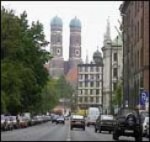 In Germany, a century-long tradition of the state offering different forms of insurance led to a different equation of what the state’s responsibilities were versus those of the individual. Today’s debates are about opening up the options for the individual and redefining the capacities of the state, particularly when the global environment is making it more difficult for governments to know when and how to intervene, regulate, and even protect its citizens.  It is not a question of whether one needs more market and less state. Both are required to deal with the challenges ahead. It is more a question of whether we can forge a consensus on what constitutes the content and measurements of the social and the market dimensions of our societies. It can be a healthy debate, so long as it is focused on policy choices and not polemics.  Along with the rest of the world, Germans need to sort these issues out. But they are not aided by those who would simplify their choices with slogans. Citizens know when the politicians themselves are spending more time fighting among themselves than forging policies. And the dangers of generating a backlash among uncertain voters make polemics a dangerous tool with a very uncertain outcome. reference ... *The Perils of PolarizingGermany's Capitalism Debate Reinventing the German Economy -- Real Audio Excerpts of Interviews with Experts on German Economy -- *Audio  Instant Play .... *Video Clips/English:What Germans Need Labels: Armageddon, Bible Prophecy, Bush Brotherhood of Death  Stumble It! Stumble It! |















































Comments on "Germany Gone Amok"
post a comment